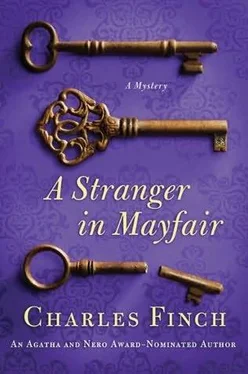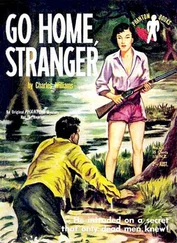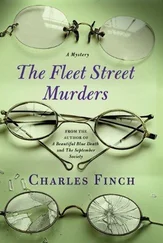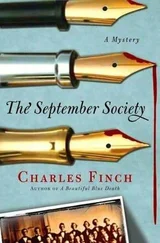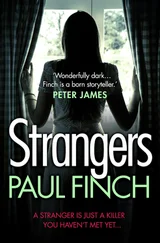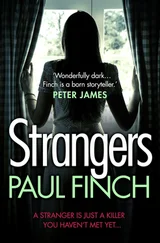Charles Finch - A Stranger in Mayfair
Здесь есть возможность читать онлайн «Charles Finch - A Stranger in Mayfair» весь текст электронной книги совершенно бесплатно (целиком полную версию без сокращений). В некоторых случаях можно слушать аудио, скачать через торрент в формате fb2 и присутствует краткое содержание. Жанр: Исторический детектив, на английском языке. Описание произведения, (предисловие) а так же отзывы посетителей доступны на портале библиотеки ЛибКат.
- Название:A Stranger in Mayfair
- Автор:
- Жанр:
- Год:неизвестен
- ISBN:нет данных
- Рейтинг книги:3 / 5. Голосов: 1
-
Избранное:Добавить в избранное
- Отзывы:
-
Ваша оценка:
- 60
- 1
- 2
- 3
- 4
- 5
A Stranger in Mayfair: краткое содержание, описание и аннотация
Предлагаем к чтению аннотацию, описание, краткое содержание или предисловие (зависит от того, что написал сам автор книги «A Stranger in Mayfair»). Если вы не нашли необходимую информацию о книге — напишите в комментариях, мы постараемся отыскать её.
A Stranger in Mayfair — читать онлайн бесплатно полную книгу (весь текст) целиком
Ниже представлен текст книги, разбитый по страницам. Система сохранения места последней прочитанной страницы, позволяет с удобством читать онлайн бесплатно книгу «A Stranger in Mayfair», без необходимости каждый раз заново искать на чём Вы остановились. Поставьте закладку, и сможете в любой момент перейти на страницу, на которой закончили чтение.
Интервал:
Закладка:
“He did all the chores a man usually does in the pub, when he was home. Fixed squeaky doors and creaking chairs, carried the kegs, rousted the patrons who had too much drink and were acting loud. It was a treat for me, not to be on my own.” Now she was really crying. “And he’s gone forever.”
Because of his work Lenox had seen so many grieving people in the last two decades that he was, to his shame, in some degree immune to their suffering. It was no different with Mrs. Clarke; he sympathized with her, but the rawness of her emotions-he could now feel detached from it. Inwardly he vowed to discover who had killed Freddie, if only to make amends for this own private callousness.
“Are you leaving town, Mrs. Clarke?”
She shook her head decisively. “Certainly not. Mr. Rathbone, who sold the Pig and Whistle some years ago, has come out of retirement to run the Dove while I’m away. I mean to stay here until I find out the truth.”
“Can I ask-who do you think killed your son?”
Her tears started afresh. “I don’t know!” she said. “I wish I did.”
“Do you recall anything else he said about life at the Starlings’, anything unusual? Anything about Mr. Collingwood?”
She thought for a moment, one delicate hand touching her pale chin. “He said that Collingwood was secretive, I remember. Freddie said, ‘I don’t have any friends in the house, only on the alley. Collingwood is far too secretive.’”
Freddie had his own secrets, thought Lenox, his mind on the money. “Did you ever send him money, by any chance?” It was a long shot.
She frowned. “No, not after his first month or so there, when I made sure he had enough. I didn’t want him to go, you see.”
“Oh?”
“He could have taken over the pub for me. Even if he had only wanted to live in London, he needn’t have been a footman. He could have taken lodgings and applied to be a tutor-he was excellent in books, you know-or any number of things. But he insisted on London, and on being a footman-and in fact on being a footman for the Starlings.”
“Why the Starlings?”
She shook her head. “He heard me talk about my days there, I suppose. He said he wanted a few years in London, and then he would decide what he should really do with his life. Do you have children, Mr. Lenox?”
“I don’t.”
“They’re mysterious creatures. You do your best with them, but in the end it’s not up to you how they live.”
Lenox took a sip of coffee, wondering to himself what could have made Freddie so adamantly desire to be a footman, a difficult job, and more specifically a footman at the Starlings’, when other options were available to him…and how did his job in Mayfair connect with the large sums of money he had been receiving under the door of the servants’ quarters?
Chapter Nineteen
Lenox had eaten little as he spoke with Mrs. Clarke, absorbed by her answers, and so at twelve thirty that afternoon he fell ravenously upon the lunch Kirk brought to his desk in the house on Hampden Lane. There was a roasted chicken, a fluffy hillock of mashed potatoes, and a beautifully charred tomato cut in quarters, along with half a bottle of dreadful claret that he nevertheless managed to get through most of. As he ate he let both Parliament and Frederick Clarke fall away from his mind and read a novel by Miss Gaskell about a small town somewhere in the Home Counties. When he was finished eating he moved to his armchair, reading on and smoking quite contentedly.
Only at two o’clock or so did he turn his attention to the tottering stack of blue books that Graham had put on his desk the night before. Their name was wonderfully evocative to Lenox (its origin was the rich blue velvet medieval parliamentary records were bound in), reminding him of harried politicians, deep matters of state, and hushed late-night discussions of strategy. As it happened, one in ten of the books-reports on every imaginable topic that affected Great Britain-was as interesting and urgent as he had imagined. The other nine would be dreadfully dull, reports from distant nations of the empire, coal statistics, a study of the increasingly serious accumulation of horse manure in Manchester.
Still, he was duty bound to read them all, or at any rate to skim them. He picked one up, spent half an hour in study, and then tossed it aside. Another. Another. Soon it was four o’clock and he knew far more than he had ever cared to about the state of Newcastle’s police force and the shortage of English beef after the previous year’s serious outbreak of a new illness called-and he had to double-check the name-“hoof and mouth” disease.
With four books absorbed, in their outlines if not in their details, he turned to a fifth. It drew him in almost like a novel-with the best novels he was at first still extremely aware that he was reading, but gradually the act of reading itself disappeared, and even turning the pages didn’t remind him that there were two worlds, inside and outside of the book’s covers. This blue book, though much more dense than a good novel, had for him that same imperative feeling.
He finished it in an hour flat, and when he was done he clutched it in one hand and, without a word to anyone in the house, made for the door and hailed a taxi.
He was after James Hilary. Although Hilary was nearly a decade younger than Lenox, he was one of the most influential men in Parliament, an urbane, learned, and fluent gentleman with a private fortune and a secure seat in Liverpool. He was irreplaceable within the party, connecting as he did the back bench and the front bench, the various offices of government to one another. If anyone would understand, it was Hilary.
As Lenox had expected he found the man-a charming, well-dressed, slightly sharp-faced sort of person-in his favored club, the Athenaeum. He was reading by a window in the great hall.
“There you are-may we speak?”
“Lenox, my dear chap, you look beside yourself. Is everything all right? Jane? I’ve scarcely said ten words to you since your wedding all those months ago.”
“Oh, quite well, quite well. It’s this.” He thrust the blue book he had been reading into the air.
Hilary narrowed his eyes, trying to catch the title of the report on the side of the book. “What is it?”
“Can we find a private room?”
“By all means.” He folded his paper. “I’m so pleased that you’ve hit the ground running. Your man, Graham, has been all over the House, too. Excellent.”
They retired to a small chamber nearby and sat at a six-sided card table, where in a few hours four or five debauched gentleman would sit until dawn, playing whist for stakes rather higher than they could afford and drinking great drafts of champagne. Lenox hated the scene: the jollity, sometimes real but often forced; the insincere banter as each man privately, worriedly totted up what he had won or lost; the casual IOUs passed from rather poor men to very rich ones, both knowing that payment would be difficult but pretending it was all the same. The room set his teeth on edge. Still, he knew what he wanted to say.
“It’s cholera,” said Lenox.
“Oh, that? Is that what you’re so worked up about, Charles? My dear chap, Bazalgette has solved-”
“He hasn’t!”
Perhaps taken aback by the fierceness of Lenox’s tone, Hilary began to look more serious. “What do you mean?”
“It’s about the poor. They’re still in danger-as anyone who read this report could tell you.”
Cholera had been for much of Victoria’s reign the chief social anxiety of London, England, and indeed the world. In England there had been epidemics in 1831, 1848, 1854, and just last year, in 1866. In the previous decade alone more than ten thousand people had died of the disease.
Читать дальшеИнтервал:
Закладка:
Похожие книги на «A Stranger in Mayfair»
Представляем Вашему вниманию похожие книги на «A Stranger in Mayfair» списком для выбора. Мы отобрали схожую по названию и смыслу литературу в надежде предоставить читателям больше вариантов отыскать новые, интересные, ещё непрочитанные произведения.
Обсуждение, отзывы о книге «A Stranger in Mayfair» и просто собственные мнения читателей. Оставьте ваши комментарии, напишите, что Вы думаете о произведении, его смысле или главных героях. Укажите что конкретно понравилось, а что нет, и почему Вы так считаете.
